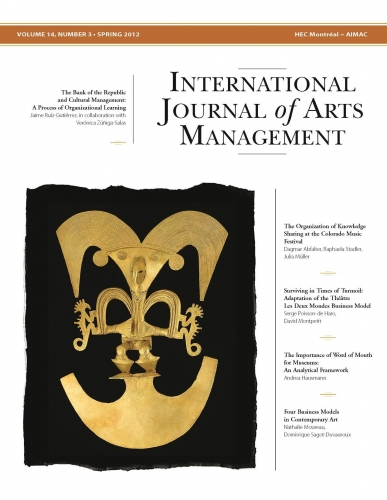The Bank of the Republic and Cultural Management: A Process of Organizational Learning
Produit: Article
21,00 $ CA
Jaime Ruiz-Gutiérrez, in collaboration with Verónica Zúñiga-Salas
Jaime Ruiz-Gutiérrez (PhD, Mathematics and Social Sciences, EHESS, Paris) is an associate professor at the Universidad de los Andes School of Management in Bogotá, Colombia. His areas of interest are arts and cultural management, organizational theory, and comparative international research.
Verónica Zúñiga-Salas is an art historian. She is currently completing a master’s degree in Management at HEC Montréal, where she is employed as a research assistant. She has also worked at several cultural institutions in Spain and Costa Rica. Her research interests focus on the management and governance of cultural organizations.
ABSTRACT
The Bank of the Republic (Banco de la República) is the central bank of Colombia and is also recognized as the country’s most important cultural management entity, both at the historical level and at the level of support for infrastructure and national scope. This case deals with organizational learning. Starting in 1927, the bank began to take on activities related to the promotion of culture on an ad hoc basis. It subsequently embarked on a process that led to a major shift in its vision of culture, and this new vision would eventually come to play a key role in the bank’s overall management. In the course of this process, the bank increased its credibility and respectability within Colombian society.
KEYWORDS
Organizational learning, cultural management, central bank, Colombia
RÉSUMÉ
La Banque de la République est la banque centrale émettrice de monnaie de Colombie, mais elle est aussi reconnue comme étant la plus importante entité publique gestionnaire de culture dans le pays, tant sur le plan historique qu’en raison de son soutien aux infrastructures et de sa couverture nationale. Ce cas porte sur l’apprentissage organisationnel. À partir de 1927, la banque a dû assumer de manière circonstancielle des activités de promotion culturelle. Par la suite, elle a entrepris un processus de transformation de sa vision de la culture, vision qui est devenue ultérieurement un élément clé dans la gestion générale de la banque. Ce faisant, l’institution acquiert une légitimité et une respectabilité solides au sein de la société colombienne.
MOTS CLÉS
Apprentissage organisationnel, gestion culturelle, banque centrale, Colombie
RESUMEN
El Banco de la República es el banco central emisor de la moneda en Colombia, también conocido como la entidad pública gestora de la cultura más importante en el país, tanto a nivel histórico como en infraestructura y en cobertura nacional. Este estudio de caso es sobre el aprendizaje organizacional. A partir del año 1927, el Banco asumió de manera circunstancial ciertas actividades de promoción cultural. Desde entonces, el Banco empezó un proceso de transformación de su visión de la cultura, para posteriormente convertirla en un elemento clave de su gestión general. Con ello, la institución adquirió una sólida legitimidad y respetabilidad en la sociedad colombiana.
PALABRAS CLAVE
Aprendizaje organizacional, gestión cultural, banco central, Colombia

